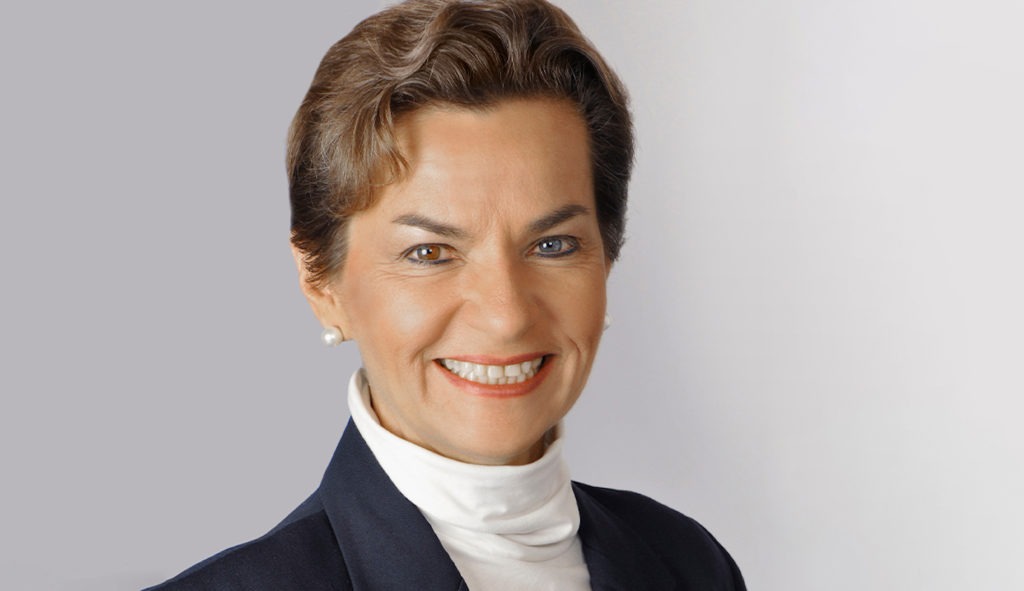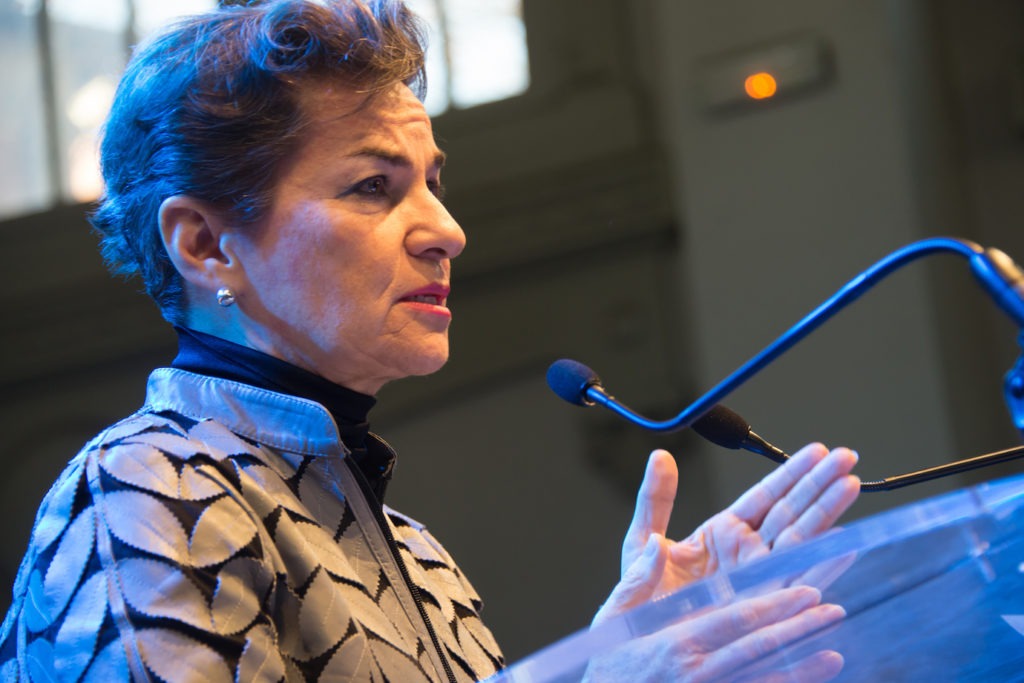Christiana Figueres was instrumental in the delivery of the historical Paris Agreement on climate change. It was far from a solo endeavour but without her leadership, as Executive Secretary of the UN Framework Convention on Climate Change from 2010 to 2016, it may not have happened.
The significant, world-changing achievement saw her collaborating with multiple parties to get 195 sovereign nations agreeing on a shared path forward to limit future global warming to well below two degrees, and to actually push further to 1.5 degrees.
It was collaborative diplomacy at its finest. And experience that gives Christiana a valuable and unique perspective on what is still possible for the world on climate change even as we grapple with a global pandemic.
World politics have changed significantly since then the Paris Agreement, notably with the election of President Donald Trump in 2016. But Figueres remains “stubbornly optimistic” because, she says, there is no other option when it comes to climate change.
I spoke to Figueres when she was recently in Australia to promote her practical and empowering new book, The Future We Choose: Surviving the Climate Crisis, co written with her former political strategist, Tom Rivett-Carnac. It outlines two different futures for humanity, issuing a call to arms to act now and solve the climate emergency. Christiana and Tom are also co-hosts on the Outrage & Optimism podcast.
Christiana was here just prior to stay-at-home orders being issued in Australia. She’s since returned to her home in Costa Rica where, like much of the rest of the world, she’s also staying in — and adapting to global work and pursuing collaboration through Zoom chats.
We’re sharing this Q&A to mark Earth Day, which happens on April 22 every year to demonstrate support for environmental protection.
I started the interview by sharing my own experience with the Australian bushfires and the huge range of feelings and emotions I’ve been feeling since, from absolute despair to anger and more. What, I asked, do we do to get to optimism?
The way that I see optimism is that I see it as a decision, it’s an intentional choice we all have to make. I don’t see optimism as something we’ve achieved or something we should celebrate.
I see it as the responsible choice we have to make, especially regarding any challenge we have in our life, but more than anything; about climate change because the consequences of climate change as you’ve now experienced are so dire that we cannot afford to lose the fight.
If you approach any challenge with a defeatist or fatalist attitude, you’re guaranteed to fail.
Since we can’t afford to fail, we have to take an optimistic route to this which means a gritty determination to harness our ingenuity and all our capacity to change things. I just don’t think that another choice is acceptable or responsible.
In your book you set out two different scenarios of two different futures ahead of us when it comes to action on cliamte change and say gender equality is one of a number of key things that will make a difference. When it comes to progress on women in representative positions, ending child marriage, closing the pay gap, getting more girls into school what differences can we expect to see in those two different futures?
In the first world, where we are moving into more strife and more conflict, and more forced migration, women and children always suffer the most in all those conditions, whether it’s conflict or war or forced migration or any kind of inequality, it’s always women and children at the bottom; that is unacceptable for this century.
Whereas in the other world; it’s a world where we’ve been able to reach gender equality and where women can make their own decisions and are participating on their own two feet shoulder to shoulder with everyone else, be able to reach decisions that are much more comprehensive in the perspective that they represent.
Do you think we talk enough about gender equality in the context of climate change? I’ve been at many IWD events in the last week and it just doesn’t come up at all.
That’s interesting. Certainly, when I was Secretary (of the UN Framework Convention on Climate Change) it was always front and centre and I think that’s because I choose to make that a priority for myself. You know when you are into a topic, you sort of attract people who are into the same thing. For me, it is front and centre, but that doesn’t mean it’s front and centre for the reality of the world. That is definitely true that the disproportionate venerability of women and children to the impact of climate change is a reality and it is not considered enough in policy or resilience measures – we’re still very blind to that.
What do you see as the role of women in climate action? What are you currently witnessing and where are you optimistic about the role women can play in the future?
I see more and more women actually involved. On the front line, women are incredibly powerful. I’m not sure if it’s by choice or if it’s because women are the ones that are responsible for food and water, and being the backbone of the family, and therefore they a more and more resourceful in their adaptiveness and resilience.
On the other extreme of the gamut; you have women who are increasingly taking leadership roles and coming up through the ranks – still not C-suite level for sure, but I do see more women in climate negotiations and climate measures in companies, and it’s evident that where there are more women in decision positions in companies, those companies are making better decisions — not just on climate but on other decisions as well.

You have hugely unique insights into collaborating and negotiating. Do you see a difference between men and women at that level when it comes to collaborating?
I do. It’s always irresponsible to generalise, but I do think there is more of a propensity for women to be collaborative, for women to be long term thinkers, and much more aware of the role we play as a steward on this planet, and for women to act according to collective voices.
You’re here in Australia, at an interesting and challenging time in our history when it comes to climate change, what would be some of the things you’d say to our Prime Minister, Scott Morrison?
I would say a few things. First, with the tragedy of the bushfires, we must take responsibility on climate change. The other message would be that I am concerned that there is an unfounded trust in the future of coal. The fact is that renewables are becoming not only more competitive but becoming cheaper than coal. I don’t see much of a future for coal as an export product for Australia. It concerns me that there is so much trust being put in the future of that export product. In particular in terms of jobs.
A switch over to renewables, to cutting edge technologies and all of that, is actually much more promising as an export product and as new industries that will create more jobs. The coal industry is not a new industry. It can’t innovate anymore. It’s lived its viable life, and it’s diminishing because of the air pollution. The social tolerance for coal is diminishing. Companies no longer want to risk their money in coal. From all these different perspectives I worry about the level of trust in coal to provide jobs in Australia.
The other thing we often talk about in Australia is the cost of action, but we don’t talk about the cost of inaction. Is it something you see around the world? It seems problematic here in Australia.
The cost of inaction has been brutally seared into everybody’s mind now with the bushfires, hasn’t it?
Some people’s minds. But the link is not seen necessarily being seen by everybody. How would you compare the conversations occurring here int he media, to other countries?
Every country is unique so of course conversations are different. Some countries are much more aware of these issues than other regions so I’m not sure if that’s a novelty. What I think is new is that I think the bushfires have risen the awareness here and I certainly know that the bushfires have increased the awareness internationally. The cost of inaction – on humans as well as the biodiversity as the economic cost.
This is 2020, a super year in the critical decade, but it now has the added challenge of coronavirus and the world is responding, we’re seeing markets falling and the media preoccupied, governments are taking huge amounts of control over populations and spending accordingly; my initial instinct is that this sets climate action significantly back.
Optimistically, do you see something else in this? Does it demonstrate global cooperation is possible?
There are several things. Obviously, that number one, with global issues, there are no borders. We can’t isolate ourselves and be immune to anything that is a global issue. That goes for coronavirus, that goes for climate change. It shows how quickly we can see out behaviour when the perception is that the spread is imminent. That is interesting. The other thing that it shows is that as human beings, we are incredibly vulnerable to new diseases and if there’s anything we should worry about its the unusual and unprecedented diseases, the rise of new diseases because of new environmental conditions. The link between health and climate change is one which we should be much more aware of.
Do you see anything in terms of how businesses and employers are adapting to less carbon intense activities?
That will depend on how long the crisis will last. Everyone is being asked to travel less, which will bring emissions down. We know that China’s emissions have already come down 25 per cent because of the lockdown and the restricted trade. It depends also on how this crisis will be brought under control; if it is resolved relatively quickly than emissions will return. If it lasts much longer, I’d be interested to see whether it will be ending, market signal through the information and communication industry about the opportunity to invest into more communication technology to allow us to continue to work effectively remotely, instead of all the travel that we all do. I think there’s a hugely interesting lesson on the not so critical need for transport.
There’s so much to potentially be gained this year, particularly with the US election and Glasgow in November [this has since been postponed]. But what if nothing is gained? Will you still stay optimistic in 2021?
Of course! We have to. As I said, optimism is not the result of having achieved anything, optimism is the gritty determination that we have to win this challenge. There is no other option we can consider. Because if we consider another option, then we go to that World number 1 I referred to before. I remain stubbornly optimistic.
What do you think are the first steps women can take to address their own contributions, because that is empowering to do that but also secondly, to really achieve a wider impact on reducing emissions?
Since women basically determine what the household does or does not, then as soon as we are aware of what our impact is through our carbon footprint, then we usually can call the shots on how we reduce our carbon footprint as a family, as a city, as a corporation, at whatever level.


